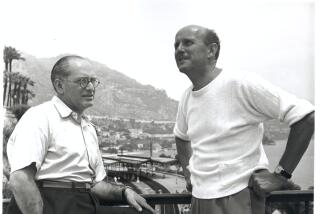NYFF 2013: How Penn & Teller came to make a movie about Dutch painting
NEW YORK -- When the popular magician and entertainer Penn Jillette walked into the offices of Hollywood executives several years ago to pitch a documentary about the Dutch painter Johannes Vermeer, he was met with skepticism. After all, Jillette and his partner Teller were known for their cheeky stage act and television work, such as “Penn & Teller: Bull—,” which aired for many years on Showtime. Surely this was a gag?
“They thought I was doing some ‘Borat’ act on them,” Jillette said at the New York Film Festival on Thursday. “People would look around for the hidden camera and how I was monkeying with them.”
But Jillette was dead serious. He had a good longtime friend, Tim Jenison, who was engaged in the quixotic act of painting a Vermeer from scratch using a new kind of optic lens he had created. Jenison had mentioned his pursuit to his showbiz friend over dinner, and Jillette decided he wanted to film it.
PHOTOS: Billion-dollar movie club
Jillette never did get the money from financiers — Hollywood is a little gun-shy about those art-themed documentaries. So he, Teller and Jenison decided to put their own money into a film — “south of a million, but hundreds of thousands,” the always-colorful Jillette said in an interview here — so they could make the movie. Jillette then hooked up with the producer Farley Ziegler, who he collaborated with on the 2005 comedy documentary “The Aristocrats.” Soon Teller was directing and producing (the performer had done a lot of stage directing but never helmed a film), Jillette was costarring and producing, and Jenison was, well, more on Jenison in a moment.
The result, titled “Tim’s Vermeer,” is one of the more unexpected documentaries to see the light of day in a long while, a story of art and obsession, weirdly procedural in its execution but oddly fascinating in its result. (The film, which has been acquired by Sony Pictures Classics and played its first official U.S. date at the New York Film Festival Thursday, will embark on an Oscar-qualifying run in December before opening in early 2014.)
Jenison, a wealthy San Antonio-based inventor who has made a handsome living creating technology for broadcast television and other mediums, had in recent years become obsessed with Vermeer, the 17th century Dutch painter whose photorealistic works have been admired and oft-studied. Some in the art community — such as the British iconoclast David Hockney, featured in the film — had come to the controversial conclusion that Vermeer had used some form of optics to help him achieve the naturalism. As a tech savant, Jenison wanted to explore the question.
PHOTOS: Hollywood backlot moments
So playing with several forms of optics — including a variation on the camera obscura you may remember from high-school science -- he figured out a way he could basically copy a Vermeer. (It involves using mirrors and lenses positioned at the right angle, such that even a highly amateur painter like Jenison could dip their brush in similar colors and replicate the work.) Jenison theorized that, to create a work of such striking realism, Vermeer must have used similar mirrors and other technological tricks from the 17th century in the first place.
Most hobbyists would have stopped there. But Jenison wanted to test if the theory was correct — really test it.
So he set about re-creating the conditions Vermeer painted in, and then tried to paint one of his paintings, “The Music Lesson,” from scratch. He built the entire room Vermeer depicted in the work, sanding, chopping, chiseling and constructing for nearly a year. He ground down paints; after all, Vermeer couldn’t drive to the local art store and pick up a few supplies. He even cast his college-age daughter as one of the models, putting her in a head-clamp (less painful than it sounds) so she’d stay immobile for hours while he painted.
Jenison then began the arduous act of painting, spending hundreds of days (shown, fortunately, selectively), putting in colors and details. “Another day, more dots,” he says with low-key comedic exasperation at one point.
PHOTOS: Celebrities by The Times
We won’t give away where it all goes, but suffice it to say that, in the process of showing all this, the movie explores important themes of creation and technology. “Is Tim an artist or is he an inventor?” Jillette, who serves as a kind of in-movie guide, says toward the end of the film. “The problem is not trying to pick but having the distinction in the first place.”
There is, of course, a clear parallel in all this to the magic practiced by the filmmakers. In a separate interview Thursday, Teller said he found similarities in how people viewed the two disciplines.
“To me, what’s very similar is that if you tell someone in a sentence how you did a magic trick, they’re not impressed,” Teller, who is on stage the silent partner to Jillette’s boisterous performer, said. “But if you spend some time walking them through how everything is done and how elaborate it is, they’re fascinated. We felt the same way with Tim’s painting.” (It should be noted that Jenison’s use of mirrors to create illusions is something that the pair are familiar with in their day jobs.)
Though it has the potential to create a backlash -- a man with no art training or talent, after all, believes he can do the same thing as one of the European greats -- Jillette said it hadn’t yet, and he was hoping it wouldn’t. Unlike sports (and much like magic), he said, painting is about result; how you get there is beside the point.
“Tim’s Vermeer” is also a portrait of a man on a mission -- but not the in the way you’d expect.
“What I love about this is that it’s a story of obsession but the guy doesn’t lose his mind,” Jillette said. “It doesn’t always have to be Ahab. We know how to tell that story. We know how to tell the story of Kurtz. But can’t it just be an ordinary guy who’s well-adjusted and happy?”
Still, it a news conference earlier in the day, Jenison said he may be curbing his obsession -- for now. “I’m interested in this topic. I don’t know if I’m interested in making a painting again,” he said. “But that could change.”
As for Penn & Teller, they’re not in a rush to make another movie of this kind, though Jillette (who also is starting out on a crowdfunding film called “Director’s Cut” in which he will allegedly be cast as what he calls a “bad guy”) isn’t ruling anything out.
“I don’t know if I’m going to have another friend who has this crazy passion to discover a 350-year-old-secret,” Jillette said. “But you never know.”
ALSO:
‘Tim’s Vermeer’ explores art, science
NYFF 2013: Can real-life basis boost ‘Captain Phillips?’
NYFF: In command performance, Cate Blanchett makes awards case
Follow me on Twitter at https://twitter.com/ZeitchikLAT
More to Read
Only good movies
Get the Indie Focus newsletter, Mark Olsen's weekly guide to the world of cinema.
You may occasionally receive promotional content from the Los Angeles Times.











